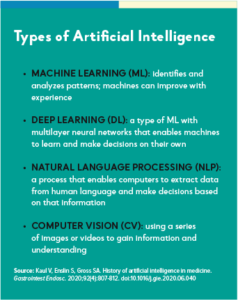
Artificial intelligence—more commonly referred to as AI—is a catch-all term that encompasses a multitude of different types of technologies and tools built to perform tasks that are typically associated with human minds. As technology has advanced over the last several decades, researchers have sought ways to apply these tools to the advancement of health care.
Within the lung cancer realm, different types of AI are being applied to advance and enhance the understanding of screening, modeling, and even treatment.
“AI is such a broad term, and in medicine we are just starting to get comfortable and understand the scope of how AI can be used to improve the health care system and outcomes for patients,” said Lecia Sequist, MD, MPH, Landry Family Professor of Medicine at Harvard Medical School and the program director of the Cancer Early Detection and Diagnostics Clinic at Mass General Cancer Center. “AI could help in so many different aspects, including screening, monitoring cancers, understanding if treatments are working, and improving patient experiences and the way hospitals work.”












 © 2025 Mashup Media, LLC, a Formedics Property. All Rights Reserved.
© 2025 Mashup Media, LLC, a Formedics Property. All Rights Reserved.